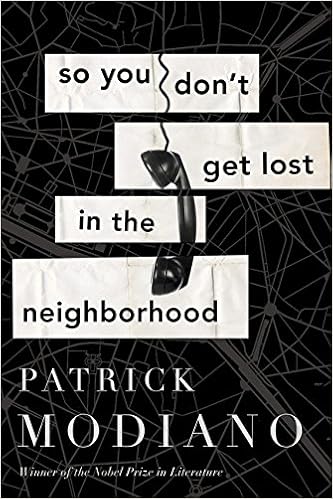This novel was my introduction to the French writer Modiano. I was reminded a bit of Camus's The Stranger, mostly because of the short length but also a bit because of the kind of distant style. The narrator does his best to keep people out of his life. I much enjoyed the work, in an intellectual sort of way.
The book centers on a novelist who receives a phone call from a stranger who has found his address book. The stranger wants to meet to hand the book over, but it turns out, upon meeting, that the stranger has read the author's work and is curious about it. Most especially, he is curious about a certain man who appears in the author's first novel, a man whose name also appears in the address book. The author doesn't recall the name--or at least, that is what he says. The stranger is doing research, writing something of his own. He asks the author to look over a dossier of materials.
The author is persuaded to do this by the stranger's daughter, who is silent whenever the stranger is around but friendly when alone with the author. She seems to have her own agenda.
The author looks through the materials and comes across one name that stirs in him a memory of the man the stranger was asking about and a host of other memories. This one name is that of a young woman, a teenager, who takes care of the author for a year or so when he is a child. Why? And why do they get separated? And what exactly did this young woman go to jail for? These and other questions are items the author then becomes obsessed with through chasing down his memories. In fact, we come to think that the author knew exactly the information the stranger seeks, for the author's memories reveal that he has gone in search of the woman and that the man is intimately involved with his reason for the start of that search. That, however, does not mean that we are easily able to figure out why these two people are looking for the man--or why the author himself has had the experiences he has, or even whether he has (for one of the themes of the book revolves around how people remember things differently and why the obfuscate the past).
Subscribe to:
Post Comments (Atom)







No comments:
Post a Comment